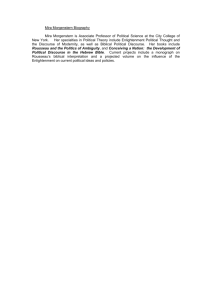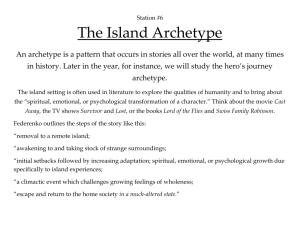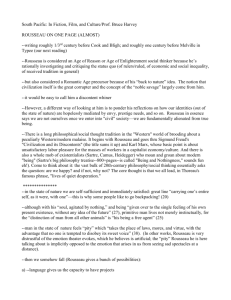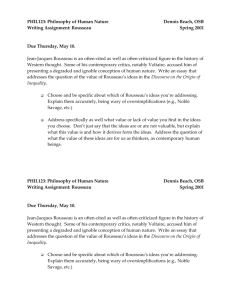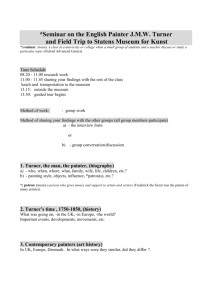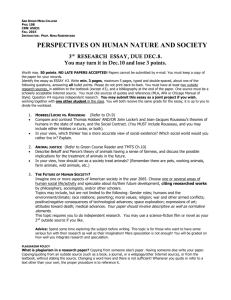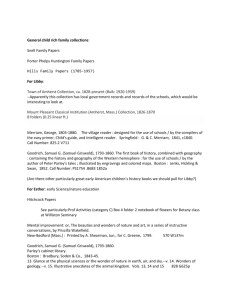Notes on Rousseau, Discourse on Inequality (The Second
advertisement
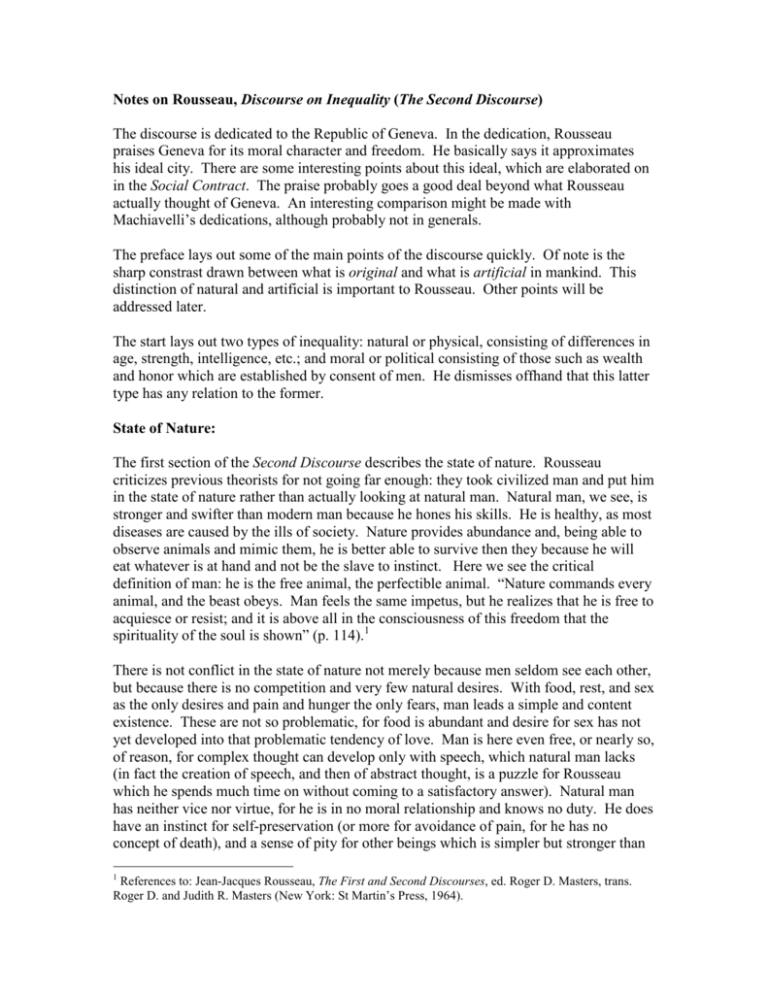
Notes on Rousseau, Discourse on Inequality (The Second Discourse) The discourse is dedicated to the Republic of Geneva. In the dedication, Rousseau praises Geneva for its moral character and freedom. He basically says it approximates his ideal city. There are some interesting points about this ideal, which are elaborated on in the Social Contract. The praise probably goes a good deal beyond what Rousseau actually thought of Geneva. An interesting comparison might be made with Machiavelli’s dedications, although probably not in generals. The preface lays out some of the main points of the discourse quickly. Of note is the sharp constrast drawn between what is original and what is artificial in mankind. This distinction of natural and artificial is important to Rousseau. Other points will be addressed later. The start lays out two types of inequality: natural or physical, consisting of differences in age, strength, intelligence, etc.; and moral or political consisting of those such as wealth and honor which are established by consent of men. He dismisses offhand that this latter type has any relation to the former. State of Nature: The first section of the Second Discourse describes the state of nature. Rousseau criticizes previous theorists for not going far enough: they took civilized man and put him in the state of nature rather than actually looking at natural man. Natural man, we see, is stronger and swifter than modern man because he hones his skills. He is healthy, as most diseases are caused by the ills of society. Nature provides abundance and, being able to observe animals and mimic them, he is better able to survive then they because he will eat whatever is at hand and not be the slave to instinct. Here we see the critical definition of man: he is the free animal, the perfectible animal. “Nature commands every animal, and the beast obeys. Man feels the same impetus, but he realizes that he is free to acquiesce or resist; and it is above all in the consciousness of this freedom that the spirituality of the soul is shown” (p. 114).1 There is not conflict in the state of nature not merely because men seldom see each other, but because there is no competition and very few natural desires. With food, rest, and sex as the only desires and pain and hunger the only fears, man leads a simple and content existence. These are not so problematic, for food is abundant and desire for sex has not yet developed into that problematic tendency of love. Man is here even free, or nearly so, of reason, for complex thought can develop only with speech, which natural man lacks (in fact the creation of speech, and then of abstract thought, is a puzzle for Rousseau which he spends much time on without coming to a satisfactory answer). Natural man has neither vice nor virtue, for he is in no moral relationship and knows no duty. He does have an instinct for self-preservation (or more for avoidance of pain, for he has no concept of death), and a sense of pity for other beings which is simpler but stronger than 1 References to: Jean-Jacques Rousseau, The First and Second Discourses, ed. Roger D. Masters, trans. Roger D. and Judith R. Masters (New York: St Martin’s Press, 1964). in civilized man (“Philosophy isolates him; because of it he says in secret, at the sight of a suffering man: Perish if you will, I am safe” (132)). This yields the maxim of nature: “Do what is good for you with the least possible harm to others” (133). A final note: even physical differences are small here, for they are caused more by nurture than nature (and the weak perish early). Leaving the state of nature: Man gradually learns to do more things as time passes. He finds fire, begins to cook and use tools, all by a slow process of trial and error and occasional observation of others. Gradually men come to have more contact, and language slowly develops, and together with it abstract thought. Man sees his superiority to the other animals, and the first stirrings of pride emerge. Still, there is a long period of little communication and no obligations (see stag hunt, p. 145). Finally with this enlightenment man begins to prefer comfort, to make huts and with this permanence began to live with the family. The strong begin, the weak follow suit. It is here that the differentiation of the sexes arises, and love of luxury begins. With more people and objects around, comparisons are made and love arises as man comes to want a particular women rather than women in general. This leads to jealousy and conflict as well. With comparisons we see who is handsome and who is strong: the favored feel vanity and contempt, the disfavored shame and envy. This is when harm came to represent contempt and became an outrage, and we enter the Hobbesian state of nature. Property has allowed man to settle and thus ruined him. Still there is a passage that suggests that in the first founding of societies, when men were had begun to gain reason but not yet gained vanity is the ideal: “this period of development of human faculties, maintaining a golden mean between the indolence of the primitive state and the petulant activity of our vanity, must have been the happiest and most durable epoch. . . . all subsequent progress has been in appearance so many steps toward the perfection of the individual, and in fact toward the decrepitude of the species” (150-51). But this primitive state did not (could not?) last. Soon agriculture and arts came about. Iron and wheat ruined man, because they made one man dependent on another and thus led the way to inequality and slavery. When land is cultivated, it must be divided; property leads to the first rules of justice. For all must have enough if any are to be secure, and wrongs toward another can be more easily avenged. Equality breaks down because small natural inequalities are magnified and permanent. With this we also see that certain qualities such as beauty, intelligence, strength and skill were required and in order to gain recognition it became necessary to either have or pretend to have these. Man became a race of deceivers. He becomes a slave whether rich or poor for he must rely on others to fulfill his many needs, not least of which is to be esteemed. But here though master and slave exist and property exists there is no security: masters are overthrown and replaced, the strong pillage, and so we get the state, founded when the wealthy convince all that it is in their interest to unite behind a leader who will be able to protect the (current) property arrangements. And so natural freedom is destroyed for all time. Yet rather than yielding peace, theses state lead not only to oppression but to even greater conflict. Murder in the name of ones state becomes a virtue. Nature was changed to make men accept and even want servitude. This was wrong: for freedom and life are not properties made by convention to be disposed of as one will but natural elements of man, the giving up of which is a degrades him. Still there is a progression: government was at first consensual, then magistracy and kingship evolved, and finally these kings became arbitrary. There are four great inequalities in society: wealth, nobility/rank, power, and personal merit. Ultimately, however, these reduce to the first, with which the others (or at least the semblance of them) can be bought. Ultimately we get a despotism reminiscent of Plato’s tyranny, where the people are subject to the will of the master, who is subject only to his own passions. He rules and is overthrown by force alone. A final thought: “the savage lives within himself; the sociable man, always outside of himself, knows how to live only in the opinion of others; and it is, so to speak, from their judgment alone that he draws the sentiment of his own existence” (179). Questions on Rousseau 4. What' s the liberal/communitarian debate Answer: "I dont know - I never learned about 9. Is Rousseau a liberal or a democrat? 10. Which of the currents in concepts is most like Rousseau - I said something about utilitarianism Make sense of Rousseau’s forcing people to be free. What problem is he trying to solve? What do any of the authors have to tell us about the nature of founding a city/ state? (I had expressed an interest in this). He asked a series of questions about the connections between international and domestic notions of sovereignty, which lead us to discuss the different conceptions of sovereignty in Hobbes and Rousseau. Compare this conception of justice with what Machiavelli or Hobbes has to say. (I picked Hobbes) For Hobbes, is there nothing on which all men agree? How should one think about patriotism? Isn' t it unjust to favor one' s own? (brief discussion of Rousseau, Alasdair MacIntyre) We also talked a lot about the importance of unity, both for Plato and for Hobbes, Rousseau, and Marx, and the negative effects of partial associations. He then asked me why, if modern thought is characterized by a concern with unity, that we normally think of it as pluralistic. Then to Rousseau: Somehow we got to R’s view of man in the state of nature. M asked me to compare Rousseau and Locke’s account of property and which I thought was correct.


